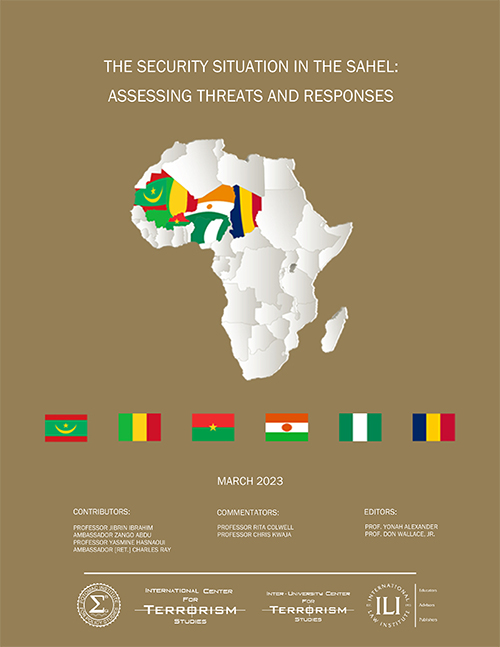 PROFESSOR YONAH ALEXANDER AND PROFESSOR DON WALLACE, JR. EDITORS
PROFESSOR YONAH ALEXANDER AND PROFESSOR DON WALLACE, JR. EDITORS
One cannot fully understand the impact of rising terrorism in North Africa and the Sahel without looking back to numerous warning signs that exploded during the post-WWII period. Thus, one tragic historical lesson relates to the December 21, 1988, mid-air explosion of Pan Am Flight 103 over Lockerbie, Scotland, perpetrated by a Libyan state-sponsored operation. It resulted in the death of 270 passengers, mostly Americans. Although Muammar Gaddafi’s 42 years of dictatorship were replaced by a new Tripoli regime in 2011, Libyan terrorism is alive and well. This brutal reality was graphically illustrated by the killing of four U.S. government personnel, including Ambassador John Christopher Stevens, in Benghazi on September 11, 2012. In fact, several days after this attack, a Libyan preacher during a Friday sermon called on the faithful to “detonate our wrath upon them” and “stab them in their main artery.”1
Therefore, it is not surprising that the Inter-University Center for Terrorism Studies (IUCTS), in cooperation with its academic partners such as the George Washington University, the Potomac Institute for Policy Studies, the International Law Institute, and other institutions in the U.S., Africa, Asia, and elsewhere have developed interdisciplinary educational programs focusing on security challenges in the Maghreb—Algeria, Libya, Mauritania, Morocco, and Tunisia—as well as adjacent areas such as Chad, Mali, Niger, Nigeria, and their regional and global strategic implications.
More specifically, our latest academic work has included a number of publications. The first on, “Why the Maghreb Matters: Threats, Opportunities & Options for Effective U.S. Engagement in North Africa” was published by the Potomac Institute for Policy Studies and the Conflict Management Program at the John Hopkins University School of Advanced International Studies on March 31, 2009. This initial work was guided by a bipartisan panel, including former Secretary of State Madeleine Albright, General (Ret.) Wesley Clark, Ambassador (Ret.) Stuart Eizenstat, Professor William Zartman, and other distinguished former officials and academics. The panel recommended more effective engagement in the region to prevent a brewing security crisis from erupting there.
Another following report is, “Terrorism in North Africa and the Sahel in 2015” that was authored by Yonah Alexander and published in March 2016. This work drew similar conclusions, thereby underscoring the pessimistic reality that the region is engaged in a generational socio-cultural conflict that impacts the global community. Indeed, events continue to point to a growing “arc of instability” across the region, with consequences beyond any country’s borders.
Additionally, in 2017, another study also authored by Yonah Alexander observed that focusing international attention on the region can help enable the seeds of conflict resolution, political accommodation, economic and social development, and national reconciliation to emerge and counter the forces of instability and chaos. The publication therefore recommended that, to be sustainable and effective, these solutions require an integration of global and local resolve as well as resources. Without an effective menu of responses to the challenges of terrorism and instability, these threats to the world community will only continue to grow.
The current March 2023 publication draws from the recent Zoom Forum titled, “The Security Situation in the Sahel: Assessing Threats and Responses” that was held virtually on November 2, 2022. It included the following distinguished invited speakers Professor Jibrin Ibrahim (Senior Fellow, Centre for Democracy & Development); Ambassador Zango Abdu (Country Manager, USIP Nigeria; Director, Sahel Institute for Strategic Studies); Professor Yasmine Hasnaoui (University Professor of Humanities & Political Science at the American International University, Kuwait); Ambassador (Ret.) Charles Ray (Former United States Ambassador to Cambodia and Zimbabwe); Professor Rita Colwell (Distinguished University Professor at Maryland and Johns Hopkins); and Dr. Chris Kwaja (Associate Professor of International Affairs at the Center for Peace and Security, Modibbo Adama University, Yola, Adamawa State, Nigeria). Deep appreciation is due to their exceptional contributions to the Forum.
